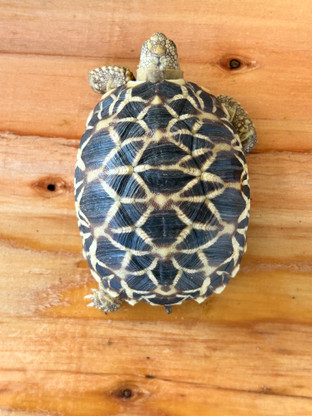- Home
- Tortoises For Sale
- Star Tortoises For Sale
- *Exact Tortoise* Baby Burmese Star Tortoise (spring 2023 babies) #7 (irregular scute pattern)
- Home
- Tortoises For Sale
- Baby Tortoises For Sale (All Species)
- *Exact Tortoise* Baby Burmese Star Tortoise (spring 2023 babies) #7 (irregular scute pattern)
- Home
- Tortoises For Sale
- Choose Your Exact Tortoise
- *Exact Tortoise* Baby Burmese Star Tortoise (spring 2023 babies) #7 (irregular scute pattern)
*Exact Tortoise* Baby Burmese Star Tortoise (spring 2023 babies) #7 (irregular scute pattern)
Product Reviews
Description
Common Name: Burmese Star Tortoise
Scientific Name: Geochelone Platynota
Current Size: 2.5-3" range
Average Adult Size: 10-14" (females larger)
Area of Origin: Myanmar
Description: Black shell color with yellow lines radiating out of the scutes. These pretty species are a high domed tortoise, with males normally quite a bit smaller than the taller, rounder, wide females. Skin color is yellow. Some amount of pyramiding (where the centers of the scutes on the shell are raised, making the tortoises look bumpy) is seen in some wild star tortoises - likely the ones from lower humidity areas. These are critically endangered in the wild, and are thought to be functionally extinct in the wild (not enough left to maintain animals in the future). There are major breeding and reintroduction efforts going on in Myanmar, and they are slowly getting repopulated in the wild. Local people and Chinese (illegally) use them as a food source.
Habitat: Hot climates. Humidity is ok for them, but the cage and substrate should not be wet. They do not hibernate, but will go through a winter slow down period during cooler weather and shortened day lengths. As adults, they can safely handle body temperatures as low as 50 degrees at night as long as they are able to heat up into the 70's during the day. Summer highs up to 120 degrees can be tolerated as long as there is a cooler, shaded retreat the tortoise can get into. Dampness is not a problem in high temperatures (a cool mud hole on a hot day), but in cooler weather the tortoises should be kept dry.
Diet: This tortoise is naturally a grazer, and will wander about nibbling on grass the majority of its natural life. In captivity, star tortoises will graze on grasses as well as leafy weeds and clover (dandelions are a favorite). As babies, we focus more on feeding them a wide mix of leafy greens (spring mix), since they have a harder time eating the more tough grass. Vegetables can be added to the diet for variety, but fruit should generally be avoided.
Adult Behavior: Adult star tortoises are peaceful, slow moving tortoises. They are un-aggressive towards eachother in most cases, and do little damage to their environment (little or no digging or burrowing). Some individuals can be skittish if spooked, but most will eagerly come to their keepers looking for food once they are comfortable in their environments. They are not very good climbers and make little attempt to escape, so a short, basic wall will contain most of these tortoises.
Our Current Care: During cooler weather or indoors, these tortoises are kept indoors on a cypress and/or coco coir substrate with a humid hidebox that they can get into at night. We raise them in cheap, simple plastic tubs that can be purchased at WalMart or Target, generally 3 to 4 square feet in size for babies. Temperatures in the room fluctuate between 75 at night up to 85 during the day, but we keep the hidebox heated to around 80-85 at night with a heat pad beind it, or a red bulb placed overhead.
Diet consists of spring mix greens with many other leafy greens offered in rotation to that (mulberry, endive, grape leaves, hibiscus leaves, diced cactus pad and we use globe mallow leaves pretty regularly). We like to also add moistened Mazuri LS tortoise diet as well as ZooMed's Gourmet Tortoise Food a few times a week, usually mixed and mashed into the leafy greens. The addition of the commercial diets take care of most or all of the supplementation needs, or you can sprinkle the food lightly with a calcium supplement 2 or 3 times a week and a multivitamin supplement 1-2 times a week. We also throw a pinch of our herbal hay on top of whatever they are eating almost daily, which adds variety and flavor and scent to everything.
The tortoises are removed from their enclosure and soaked in a separate 1/4" deep pan of warm water daily or almost daily for 30 minutes each time. We don't generally use water dishes in the enclosures because of the risk of drowning (yes, we have lost babies to drowning when they flipped over in 1/4" of water).
Being an arid climate species, they should have intense lighting, and they need lights on during the day and off at night to maintain a normal day/night cycle. We use full spectrum UVB lights, which we suggest for the growth of pretty, healthy tortoises, and use a ZooMed Powersun bulb in a small part of the enclosure to give them a "hot spot" around 95-100 degrees that they can get into if they want to warm up.
 Loading... Please wait...
Loading... Please wait...

